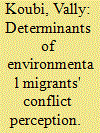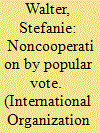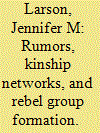|
|
|
Sort Order |
|
|
|
Items / Page
|
|
|
|
|
|
|
| Srl | Item |
| 1 |
ID:
162514


|
|
|
|
|
| Summary/Abstract |
Bilateral defense cooperation agreements, or DCAs, are now the most common form of institutionalized defense cooperation. These formal agreements establish broad defense-oriented legal frameworks between signatories, facilitating cooperation in such fundamental areas as defense policy coordination, research and development, joint military exercises, education and training, arms procurement, and exchange of classified information. Although nearly a thousand DCAs are currently in force, with potentially wide-ranging impacts on national and international security outcomes, DCAs have been largely ignored by scholars. Why have DCAs proliferated? I develop a theory that integrates cooperation theory with insights from social network analysis. Shifts in the global security environment since the 1980s have fueled demand for DCAs. States use DCAs to modernize their militaries, respond to shared security threats, and establish security umbrellas with like-minded states. Yet, demand alone cannot explain DCA proliferation; to cooperate, governments must also overcome dilemmas of mistrust and distributional conflicts. I show that network influences increase the supply of DCAs by providing governments with information about the trustworthiness of partners and the risk of asymmetric distributions of gains. DCAs become easier to sign as more states sign them. I identify two specific network influences—preferential attachment and triadic closure—and show that these influences are largely responsible for the post-Cold War diffusion of DCAs. Novel empirical strategies further indicate that these influences derive from the proposed informational mechanism. States use the DCA ties of others to glean information about prospective defense partners, thus endogenously fueling further growth of the global DCA network.
|
|
|
|
|
|
|
|
|
|
|
|
|
|
|
|
| 2 |
ID:
162518


|
|
|
|
|
| Summary/Abstract |
Existing scholarship attributes various political and economic advantages to democratic governance. These advantages may make more democratic countries prone to financial crises. Democracy is characterized by constraints on executive authority, accountability through free and fair elections, protections for civil liberties, and large winning coalitions. These characteristics bring important benefits, but they can also have unintended consequences that increase the likelihood of financial instability and crises. Using data covering the past two centuries, I demonstrate a strong relationship between democracy and financial crisis onset: on average, democracies are about twice as likely to experience a crisis as autocracies. This is an empirical regularity that is robust across a wide range of model specifications and time periods.
|
|
|
|
|
|
|
|
|
|
|
|
|
|
|
|
| 3 |
ID:
162517


|
|
|
|
|
| Summary/Abstract |
Migration is likely to be a key factor linking climate change and conflict. However, our understanding of the factors behind and consequences of migration is surprisingly limited. We take this shortcoming as a motivation for our research and study the relationship between environmental migration and conflict at the micro level. In particular, we focus on environmental migrants' conflict perceptions. We contend that variation in migrants' conflict perception can be explained by the type of environmental event people experienced in their former home, whether gradual, and long-term or sudden-onset, short-term environmental changes. We develop this argument before quantitatively analyzing newly collected micro-level data on intra-state migration from five developing countries. The results emphasize that migrants who experienced gradual, long-term environmental events in their former homes are more likely to perceive conflict in their new location than those having experienced sudden, short-term environmental events. These findings are in line with our theoretical argument that environmental migrants who suffer from environmentally induced grievances are ultimately more likely to perceive conflict and challenges in their new locations.
|
|
|
|
|
|
|
|
|
|
|
|
|
|
|
|
| 4 |
ID:
162515


|
|
|
|
|
| Summary/Abstract |
Existing theories predict that the rise of China will trigger a hegemonic transition and the current debate centers on whether or not the transition will be violent or peaceful. This debate largely sidesteps two questions that are central to understanding the future of international order: how strong is the current Western hegemonic order and what is the likelihood that China can or will lead a successful counterhegemonic challenge? We argue that the future of international order is shaped not only by material power but also by the distribution of identity across the great powers. We develop a constructivist account of hegemonic transition and stability that theorizes the role of the distribution of identity in international order. In our account, hegemonic orders depend on a legitimating ideology that must be consistent with the distribution of identity at the level of both elites and masses. We map the distribution of identity across nine great powers and assess how this distribution supports the current Western neoliberal democratic hegemony. We conclude that China is unlikely to become the hegemon in the near term.
|
|
|
|
|
|
|
|
|
|
|
|
|
|
|
|
| 5 |
ID:
162513


|
|
|
|
|
| Summary/Abstract |
How do institutions shape revisionist behavior in world politics? Applying a network-relational approach to revisionist states and challenges to institutional order, I conceive of institutions as networks—as patterns of ongoing social transactions in which revisionists are embedded. Revisionist behavior is shaped by how a state is positioned within this existing network of institutions. A state's position significantly influences the material and cultural resources the state can deploy in pursuit of its aims, and thus the revisionist's strategy. Focusing on two measures of network position—access and brokerage—I propose four ideal types of revisionists and their strategies in the international system: integrated revisionists, who are likely to pursue institutional engagement; bridging revisionists, who will seek rule-based revolution; isolated revisionists, who prefer to exit the institutional system; and rogue revisionists, who have few resources at hand, and thus ultimately must resort to hegemonic violence. I test these ideal types in four cases of revisionists and institutional orders: Russia in the 1820s; Prussia in the 1860s; the Soviet Union in the early Cold War; and Japan in the 1920s and 1930s.
|
|
|
|
|
|
|
|
|
|
|
|
|
|
|
|
| 6 |
ID:
162519


|
|
|
|
|
| Summary/Abstract |
When popular referendums fail to ratify new international agreements or succeed in reversing existing ones, it not only affects domestic voters but also creates negative spillovers for the other parties to such agreements. We explore how voters respond to this strategic environment. We use original survey data from a poll fielded just one day before the 2015 Greek bailout referendum—a referendum in which the stakes for other countries were particularly high—to investigate how expectations about the likely foreign response to a noncooperative referendum outcome influence voting behavior and to what extent foreign policymakers can influence those expectations. Our analysis of the Greek referendum shows that such expectations had a powerful effect on voting behavior: voters expecting that a noncooperative referendum outcome would force Greece to leave the eurozone were substantially more likely to vote cooperatively than those believing that it would result in renewed negotiations with the country's creditors. Leveraging the bank closure that took place right before the vote, we also show that costly signals by foreign actors made voters more pessimistic about the consequences of a noncooperative vote and substantially increased the share of cooperative votes.
|
|
|
|
|
|
|
|
|
|
|
|
|
|
|
|
| 7 |
ID:
162516


|
|
|
|
|
| Summary/Abstract |
While rumors predominate in conflict settings, researchers have not identified whether and why they influence the start of organized armed conflict. In this paper, we advance a new conceptualization of initial rebel group formation that aims to do so. We present a simple game-theoretic network model to show why the structure of trusted communication networks among civilians where rebel groups form—which carry credible rumors about the rebels—can influence whether incipient rebels become viable. We argue further that in rural Sub-Saharan Africa, kinship network structures favorable to nascent rebels often underlie ethnically homogeneous localities, but not heterogeneous ones. In doing so, we advance a new explanation for why ethnicity influences conflict onset, and show why ethnic grievances may not be a necessary condition for the emergence of “ethnic rebellion.” We illustrate our arguments using new evidence from Uganda that provides a rare window into rebel group formation.
|
|
|
|
|
|
|
|
|
|
|
|
|
|
|
|
|
|
|
|
|